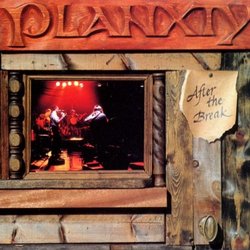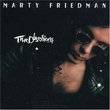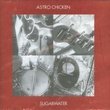| All Artists: Planxty Title: After the Break Members Wishing: 5 Total Copies: 0 Label: Tara Records Release Date: 10/9/1992 Album Type: Import Genres: Folk, International Music, Pop, Rock Styles: British & Celtic Folk, Contemporary Folk, Celtic, Europe, Britain & Ireland, Folk Rock Number of Discs: 1 SwapaCD Credits: 1 UPCs: 182478434720, 5099207300124 |
Search - Planxty :: After the Break
 | Planxty After the Break Genres: Folk, International Music, Pop, Rock
|
Larger Image |
CD DetailsSimilar CDs
|
CD ReviewsEssential Celtic Title 07/20/1999 (5 out of 5 stars) "No other Planxty release comes close to this one in my mind for sheer intensity. The instrumental sets are some of the best ever recorded, with melody emphasis on Molloy's flute and O'Flynn's piping wonderfully complemented by Irvine, Lunny and Moore on mandolin, bouzouki and guitar. A very rich sound, with strong, thought out tune sets whose parts work excellently together. Those five instrumental sets alone make this one a must have, but there are also some great songs ('The Rambling Siuler' being my favorite). One of the best." Surpasses the first generation of Planxty - easily mianfei | 03/22/2004 (5 out of 5 stars) "Following three albums that served to define the sound of traditional Irish folk in the middle 1970s, Planxty broke up in 1976, only to reform in 1979 at the height of the "punk revolution".
Whilst the "punk revolution" might have taken the spotlight away from "After The Break", there is no dount how much the album showed the second generation of Planxty to have developed as musicians. Whereas the songs on first-generation Planxty albums tended to be short but not sharp, leaving the players with too little room to express themselves, on "After The Break" the more opened-out arrangements serve the group perfectly, allowing them to develop sublime melodies and freeing Christy Moore's voice so that it sounded less rough and ready than on early albums. "The Good Ship Kangaroo" was an amazingly tender opener perfectly expressing the fear inherent in sailing to Australia, and "The Pursuit Of Farmer Michael Hayes" sounded truly modern in its lyrics without sacrificing the character of traditional song - and Planxty managed to produce mood changes a listener would never notice. The jigs "East At Glendart" and "Brian O'Lynn" show the degree to which Planxty moved away from basic Irish music through Matt Molloy's presence on flute. One of the things that made "After The Break" such a special album was the way in which the woodwinds interplayed on "East At Glendart" and "Brian O'Lynn". The dark "You Rambling Boys Of Pleasure" showed that Planxty could grow in depth and loosen up to beautiful effect without sacrificing their traditional credentials, whilst the raucous reel "The Blackberry Blossom" showed the band playing much more starkly and sharply than on previous albums. Liam O'Flynn gave the same ecstatic emotion on uillean pipes that made Kate Bush's "Night Of The Swallow" so incredible, aided again by Molloy's melodic flute in the background. The forthright, eerie yet catchy "The Rambling Siúler" was the strongest song here: fast and simple, yet so true a story that one is shocked that Christy Moore can maintain his feeling without despair, and "The Bonny Light Horseman" almost managed the same trick to the same degree. Besides their use of beautiful, dark flute melodies, Planxty closed "After The Break" with a surprise in the form of the Bulgarian dance tune "Smeceno Horo". Illustrating the connection between Irish and East European culture, the tender flute sounded quite like a pipe in some places, and "Smeceno Horo" really was far more danceable than anything ever mut out by English folk groups: the rhythm was emphasised to compensate for the absence of melodic, touching vocals. Moreover, the song changes rhythm so abruptly that Planxty makes one never notice it at all. Sharper, yet at the same time more expansive and more tuneful, this album and its follow-up The Woman I Loved So Well are where Planxty showed themselves the undoubted masters of Irish folk music after struggling on their earlier albums. Hard to find, but worth the effort." |

 Track Listings (10) - Disc #1
Track Listings (10) - Disc #1


